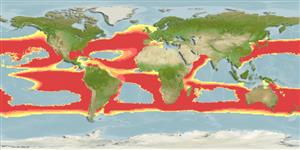Classification / Names
Common names from other countries
Main reference
Size / Weight / Age
Max length : 427 cm TL male/unsexed; (Ref. 106604); 417.0 cm TL (female); common length : 200 cm TL male/unsexed; (Ref. 5217)
Length at first maturity
Lm ?, range 205 - 228 cm
Environment
Marine; pelagic-oceanic; oceanodromous (Ref. 51243); depth range 0 - 1752 m (Ref. 106604)
Climate / Range
Subtropical, preferred 28°C (Ref. 107945); 46°N - 35°S, 180°W - 180°E (Ref. 43278)
Distribution
Western Atlantic: Gulf Stream and Florida, USA; also Cuba. Reported from southern Brazil (Ref. 13574). Eastern Atlantic: Guinea, Ghana. Western Indian Ocean: Madagascar. Pacific Ocean: Taiwan, near Phoenix Island, and north of Hawaii (Ref. 13574).
Countries | FAO areas | Ecosystems | Occurrences | Introductions
Short description
Dorsal
spines
(total): 0;
Dorsal
soft rays
(total): 0;
Anal
spines: 0;
Anal
soft rays: 0. Pectoral fins about as long as head or longer, relatively broad-tipped in young and adults; snout usually narrowly to bluntly pointed, usually not acute; cusps of upper and lower anterior teeth straighter, with tips not reversed (Ref. 43278). Caudal fin lunate, with a very long lower lobe (Ref. 13574). Dark blue above, white below, with dusky markings on underside of snout, around mouth (Ref. 6581).
IUCN Red List Status (Ref. 115185)
Threat to humans
Traumatogenic (Ref. 13574)
Human uses
Fisheries: minor commercial
More information
ReferencesAquacultureAquaculture profileStrainsGeneticsAllele frequenciesHeritabilityDiseasesProcessingMass conversion
Tools
Special reports
Download XML
Internet sources
Estimates of some properties based on models
Phylogenetic diversity index
PD50 = 0.7813 many relatives (e.g. carps) 0.5 - 2.0 few relatives (e.g. lungfishes)
Trophic Level
4.5 ±0.0 se; Based on diet studies.
Resilience
Very Low, minimum population doubling time more than 14 years (Fec=2)
Vulnerability
Very high vulnerability (86 of 100)
Price category
